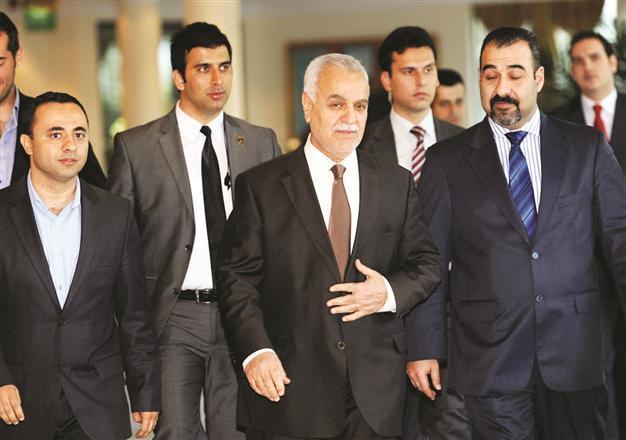Hashemi ‘red notice’ stirs Turk, Iraqi row
LYON / ANKARA

Fugitive VP Hashemi, accused of terrorism activities, says he has no faith in the Iraqi justice system. AFP photo
The international police agency Interpol’s issuing of a red notice for fugitive Iraqi Vice President Tariq al-Hashemi on suspicion of “guiding and financing terrorist attacks” is a potential source of tension between Turkey and Iraq, and could push Iraq to ask Turkey to hand over the prominent Sunni politician.“I am aware of his [al-Hashemi’s] appeal to Iraqi Interpol. I know he has taken the necessary steps through his lawyers,” Prime Minister Recep Tayyip Erdoğan told reporters in Rome yesterday. “I believe he will return to his country following his treatment,” he added, hinting that Hashemi would not be arrested by Turkish police or deported to Iraq on the basis of Interpol’s red notice.
“I will not bow to pressure and blackmail,” al-Hashemi said in a statement issued late Tuesday. He also vowed to work with his political allies to resolve the ongoing crisis in Iraq, adding he was not surprised that Iraqi Prime Minister Nouri al-Maliki has taken such a step against him. “Everyone is innocent until proven guilty,” he said.
Although al-Hashemi will not be arrested by Turkish police, the Interpol notice could lead Baghdad to issue an official request that Turkey hand him over to Iraqi officials, which Iraq has not done since the Sunni politician arrived in Turkey four weeks ago. Problems could arise between Ankara and Interpol if Turkey refuses to take action and allows al-Hashemi to travel freely, although Turkey’s only obligation is to notify Interpol that he is in Turkey.
“The red notice for al-Hashemi represents a regional and international alert to all of Interpol’s 190 member countries to seek their help in locating and arresting him,” the Lyon-based international police agency said.
However, Turkish diplomatic sources said the red notice is not an arrest warrant, and it doesn’t force member countries to arrest the person whose name it is attached to. The notice is more like a criminal complaint announcing that Iraq is looking for the person in question, asking countries to assist in locating him, they said. Under normal procedure, the Foreign Ministry should inform the Justice Ministry about the red notice, and ask it to apply to a local court to issue an arrest warrant upon demand from Interpol. The arrested person can then be extradited to the requesting country.
Although there has been a valid extradition treaty in place between Turkey and Iraq since 1995, it has never been activated because Baghdad has refused to arrest a number of outlawed Kurdistan Workers’ Party (PKK) terrorists believed to be in Iraqi territory. The same agreement also has some reservations restricting the extradition of persons who are believed to be sought due to political motives or his or her ethnicity or sect.
Al-Hashemi hosted as vice president
“We believe al-Hashemi’s case is a political one,” a senior Turkish diplomat told the Hürriyet Daily News. “We have told him that it would be much better for him to continue his legal struggle in his country. We have never said that he will be allowed to stay in Turkey forever, unless his life is in danger in northern Iraq. We have been hosting him as the vice president of Iraq, and he will continue to be treated accordingly.”
Nearly 20 police officers have been appointed to provide security for al-Hashemi around the house where he is staying in Istanbul’s Başakşehir district. Al-Hashemi refused to reply to the Daily News’ questions about the Interpol red notice yesterday. A police officer, who asked to remain anonymous, said, “Al-Hashemi’s advisers will make a statement if he finds it necessary.” Police officers from the Special Operations Department have taken intense security precautions around the house since the red notice was issued.
You may find the full text of Hashemi's statement on Interpol's red notice here.
İpek Yezdani and Erdem Güneş contributed to this report.
















